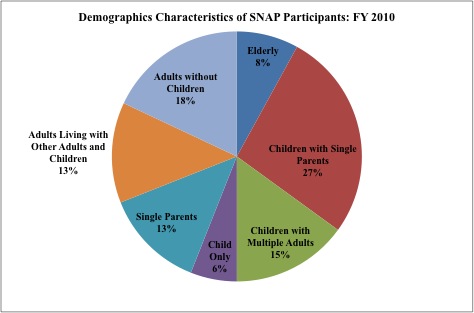House Committee Proposal Cuts SNAP
May 4th, 2012
Last month, the House Agricultural Committee voted to cut the federal food stamp program, also known as the Supplemental Nutrition Assistance Program (SNAP). This proposal would cut SNAP by more than $33 billion over the next ten years, and if turned into law, would affect virtually all SNAP households in the United States.
SNAP provides short-term, monthly assistance to millions of low-income families to help put food on the table. In February 2012, there were over 46 million people participating in SNAP and over 650,000 SNAP participants in Mississippi (USDA: Food and Nutrition Service, 2012). According to the Center on Budget and Policy Priorities (CBPP) (2012), approximately 2 million individuals would lose SNAP benefits completely, while the remaining 44 million would have reduced benefits, as a result of the proposed budget cut.

Source: USDA: Food and Nutrition Service. (2012, April). Building a healthy America: A profile of the Supplemental Nutrition Assistance Program. Retrieved from http://www.fns.usda.gov/ORA/menu/Published/SNAP/FILES/Other/BuildingHealthyAmerica.pdf
The Committee’s proposal would also eliminate Broad-Based Categorical Eligibility, requiring states to reinstate the asset test for SNAP eligibility. Under Broad-Based Categorical Eligibility, nearly all households become categorically eligible for SNAP if they receive non-cash Temporary Assistance for Needy Families (TANF) or maintenance of effort (MOE) funded benefit or service, such as an informational pamphlet or 800-number (USDA: Food and Nutrition Service, 2011).
Broad-Based Categorical Eligibility provides the opportunity for low-income people to build the savings they need while receiving short-term benefits. However, reinstating the asset test would limit SNAP benefits to low-income people with no or few assets, making it increasingly more difficult for people to become eligible for SNAP.
Likewise, this proposal would remove approximately $8 billion from the economy from the last quarter of 2012 through 2013 (CPBB, 2012). Importantly, SNAP puts money directly into the economy when times are tough. People spend SNAP assistance quickly and locally supporting grocers and other economic activity. When SNAP benefits are reduced, local small businesses are hurt as well.
As a result, Congress should take a balanced approach in protecting both the nation’s economic security, its small businesses and the millions of families who are struggling with poverty. Policies like Broad-Based Categorical Eligibility should be protected rather than eliminated, as they provide a safety net for low-income Mississippians to save and build assets while they work their way toward financial stability.
Sources:
CPBB. (2012, April 18). House Agricultural Committee proposal would cut 2 million people off food stamps, reduce benefits for more than 44 million others. Retrieved from http://www.cbpp.org/cms/index.cfm?fa=view&id=3749
USDA: Food and Nutrition Service. (2011, Jan 30). Questions and answers on Broad-Based Categorical Eligibility. Retrieved from http://www.fns.usda.gov/snap/rules/Memo/2011/013111.pdf
USDA: Food and Nutrition Service. (2012, April). Building a healthy America: A profile of the Supplemental Nutrition Assistance Program. Retrieved fromhttp://www.fns.usda.gov/ORA/menu/Published/SNAP/FILES/Other/BuildingHealthyAmerica.pdf
USDA: Food and Nutrition Service. (2012, April 30). Supplemental Nutrition Assistance Program: Number of persons participating – one month change. Retrieved from http://frac.org/wp-content/uploads/2011/01/snapdata2012_february.pdf






